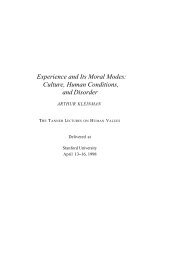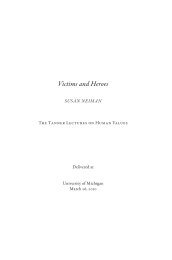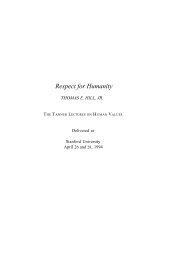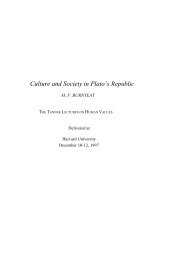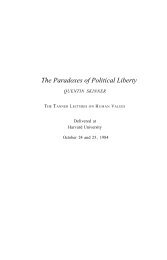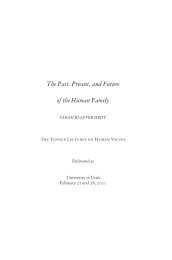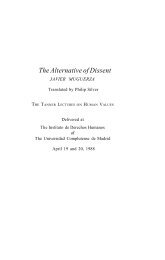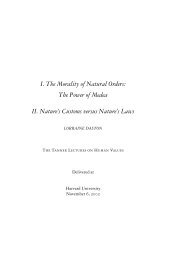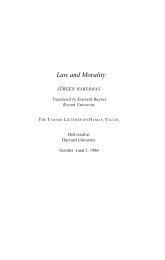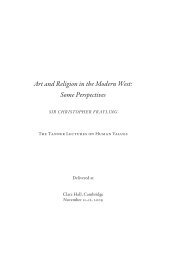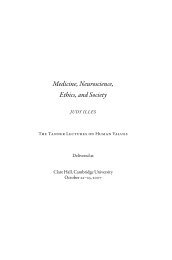Slote, Michael - The Tanner Lectures on Human Values
Slote, Michael - The Tanner Lectures on Human Values
Slote, Michael - The Tanner Lectures on Human Values
Create successful ePaper yourself
Turn your PDF publications into a flip-book with our unique Google optimized e-Paper software.
94 <str<strong>on</strong>g>The</str<strong>on</strong>g> <str<strong>on</strong>g>Tanner</str<strong>on</strong>g> <str<strong>on</strong>g>Lectures</str<strong>on</strong>g> <strong>on</strong> <strong>Human</strong> <strong>Values</strong><br />
man psychology) of dissatisfacti<strong>on</strong> and insufficiency. So at least<br />
some of the reas<strong>on</strong>s for our low opini<strong>on</strong> of egoistic individuals -<br />
the reas<strong>on</strong>s deriving less from our moral and altruistic feelings<br />
and more from our sense of what is properly and self-respectingly<br />
human - mirror our earlier criticisms of the optimizing temperament,<br />
and I believe the interplay and analogy between what philosophers<br />
find it natural to say about the oppositi<strong>on</strong> between<br />
egoism and altruism and what I have here suggested about the<br />
oppositi<strong>on</strong> between moderati<strong>on</strong> and optimizati<strong>on</strong> may help to<br />
clarify and support the picture I have been offering.<br />
Both altruism and moderati<strong>on</strong> are traits requiring cultivati<strong>on</strong><br />
within the individual. In some sense they do not come naturally,<br />
and parents, teachers, and others have a difficult task <strong>on</strong> their<br />
hands when they attempt to overcome or mitigate children’s insatiable<br />
selfishness and greed. <str<strong>on</strong>g>The</str<strong>on</strong>g> typical simplified picture of<br />
how a child develops intrinsic c<strong>on</strong>cern for others involves the<br />
assumpti<strong>on</strong> that children need to go through an intermediate stage<br />
where they see a c<strong>on</strong>cern for others as furthering their own interests;<br />
and a similarly simplified picture of the attenuati<strong>on</strong> of<br />
childhood demandingness and greediness might well depict the<br />
child as having to go through a stage where moderati<strong>on</strong> was seen<br />
(in the Epicurean manner) merely as a means to greater overall<br />
satisfacti<strong>on</strong> (the cake will spoil your dinner or give you a tummy<br />
ache). But just as the development of some degree of intrinsic<br />
c<strong>on</strong>cern for others is typically regarded as a form of moral progress,<br />
I believe that the development of some degree of n<strong>on</strong>instrumental<br />
moderati<strong>on</strong> is also a good thing, a kind of human<br />
progress.<br />
This is not, of course, to deny that moderati<strong>on</strong> for its own sake<br />
can be overd<strong>on</strong>e or that instrumental moderati<strong>on</strong> is useful and<br />
sometimes admirable. Asceticism, certain forms of puritanism,<br />
and the Stoic indifference to the goods of this world all seem<br />
examples of moderati<strong>on</strong> g<strong>on</strong>e haywire; and what I have been<br />
recommending, or at least commending, is something soberer that




